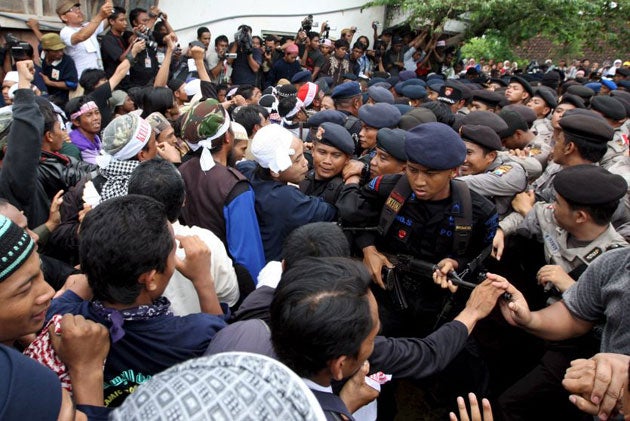Bali bombers buried as Muslim martyrs

Your support helps us to tell the story
From reproductive rights to climate change to Big Tech, The Independent is on the ground when the story is developing. Whether it's investigating the financials of Elon Musk's pro-Trump PAC or producing our latest documentary, 'The A Word', which shines a light on the American women fighting for reproductive rights, we know how important it is to parse out the facts from the messaging.
At such a critical moment in US history, we need reporters on the ground. Your donation allows us to keep sending journalists to speak to both sides of the story.
The Independent is trusted by Americans across the entire political spectrum. And unlike many other quality news outlets, we choose not to lock Americans out of our reporting and analysis with paywalls. We believe quality journalism should be available to everyone, paid for by those who can afford it.
Your support makes all the difference."Welcome martyrs" said a banner at the cemetery in the East Java village of Tenggulun, where two local sons, Amrozi Nurhasyim and Ali Ghufron (known as Mukhlas), were buried yesterday after being executed for their part in the 2002 Bali nightclub bombings.
The brothers' funerals were attended by hundreds of extremists, who clashed with police after the bodies were flown home by helicopter from an Indonesian prison island. There were similar scenes in Serang, West Java, where the remains of Abdul Aziz (Imam Samudra) were interred after being washed, according to Muslim custom, by his family.
The executions by firing squad in a field just after midnight had been much delayed. Convicted in 2003, the bombers greeted their death sentences with jubilation, then spent five years launching one appeal after another.
There was a mixed reaction to their executions among relatives of the 202 people, including 28 Britons, killed in the twin blasts on the Indonesian resort island. While some welcomed them as just, others condemned them for making martyrs of the men.
The radicals who descended on Tenggulun and Serang days ago, certainly believe the bombers died for a sacred cause. But most Indonesians abhor their violence.
The trio, members of the al-Qa'ida-linked extremist organisation Jemaah Islamiyah, were part of a much larger network that planned and carried out the explosions at the Sari Club and Paddy's Bar, in the tourist enclave of Kuta. Eighty-eight Australians and 38 Indonesians were among the dead.
In Britain, a group representing 26 victims' families condemned the executions. Relatives noted that the alleged mastermind of the bombings, Riduan Isamuddin (Hambali), has yet to stand trial. He is in Guantanamo Bay.
With security stepped up across Indonesia amid fears of reprisals, the Australian and British governments warned travellers about the danger of retaliatory attacks.
Amrozi, 47, Mukhlas, 48, and Imam Samudra, 38, were led from their cells on Nusakambangan island early yesterday and strapped to wooden poles before being shot dead. All three declined blindfolds. In Tenggulun, the crowd wept and shouted "Allahu Akbar" (God is great) on seeing two black crows hover as the helicopter bearing the brothers' bodies arrived. Onlookers surged towards the ambulances delivering them to a mosque for prayers, and then to their burial place, jostling with police.
In Serang, the remains of Imam Samudra were paraded through the streets, covered with a black shroud. His family handed out copies of his will, which urged sympathisers to carry out more attacks against non-Muslims.
Lawyers for the three men say they plan to sue the government because their clients were shot, rather than beheaded, as they had requested.
Join our commenting forum
Join thought-provoking conversations, follow other Independent readers and see their replies
Comments